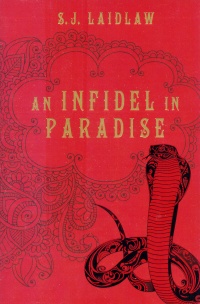| ________________
CM . . .
. Volume XIX Number 29. . . .March 29, 2013
excerpt:
Sixteen-year-old Emma’s life has always been defined by change. As the daughter of a Canadian diplomat, she and her siblings have learned to adjust to new schools, make new friends, and figure out the new cultural climate at each new posting. This time is a little different. Emma’s mother has moved the three children to Islamabad, Pakistan, alone. Emma’s father has stayed behind in Manila with his new love, the family’s ex-maid. This move is proving too much for Emma. She can no longer open herself up for fleeting friendships. Even staying close to her brother and sister is taking too much emotional effort. She is angry with her parents and can’t even begin to empathize with the pain the rest of her family is in. Partner these feelings with typical teenage angst and an unstable political climate in a religiously restrictive culture, and Emma is on the edge. Emma tries to navigate through the complex cultures of her new school. The students are either from diplomatic families from across the world or they are the elite from Islamabad. The local students are resentful of the visitors but also intrigued by their very different lifestyles. Emma and Mustapha, the most popular boy, develop a love/hate relationship which is further complicated by Mustapha’s betrothal to Aisha. Needless to say, Aisha takes an immediate dislike to Emma, making school life more torturous. This tension remains throughout the novel, reminding the reader that some teenage behaviour extends beyond cultural and geographic boundaries. Emma begins a reluctant friendship with Angie, an American, and their friendship is challenged by the political attacks on the American embassies. Their friendship is defined by their own cultures but also by the culture in which they are guests. At home, Emma is angry with both of her parents, but it is her mother who takes the brunt of this anger. Emma moves from bad decision to bad decision as she tries to work through her anger. Emma’s teenage rebellion eventually clashes with the unstable political climate, and she is forced to see herself and others more clearly. An Infidel in Paradise engages the reader in multiple storylines. Told with Emma’s voice, her pain and hurt are obvious. She can feel herself withdrawing and is often ashamed of her anger and bitterness. She seeks sanctuary in two different places. First, in the green house of the school where Mr. Akbar, the gardener, helps Emma to trust herself and others. Emma also takes a type of comfort in connecting with the “trash-picking” kids who scavenge near her house. It is this experience that also helps her to see Aisha in a different light. Throughout the story Emma learns about herself and about Pakistan. She learns that ugliness is inside other people like the man they meet at the market:
But she also learns that in every culture there are people like Mr. Akbar who make up for that ugliness with beauty. Through him, she is able to see the beauty of the landscape and the culture. Emma also learns that most people are more complex than that. Her relationships with Mustapha and Aisha have to be negotiated as they come to understand and value each other. Laidlaw has created a rich and layered text. Readers see Emma and her world through multiple lenses: teenager, diplomat, Canadian. Her descriptions of both the very rich and the very poor communities of Islamabad are carefully and respectfully drawn. Seeing this world through the eyes of a teenager gives the reader the opportunity to explore the differences in a very engaging way. Emma is a strong, but flawed, character. Her feelings are so well described that readers will feel themselves working through her thinking with her. The secondary characters are also well-written; as each of her new friends has her/his own beliefs and values that influence the direction of the story. I thoroughly enjoyed reading An Infidel in Paradise. It was interesting to read about Pakistan, about diplomatic service, and most importantly, it was a pleasure to read about Emma. Highly Recommended. Karen Boyd is a doctoral candidate in language and literacy and an instructor in the Bachelor of Education program at the University of Manitoba in Winnipeg, MB.
To comment
on this title or this review, send mail to cm@umanitoba.ca.
Copyright © the Manitoba Library Association. Reproduction for personal
use is permitted only if this copyright notice is maintained. Any
other reproduction is prohibited without permission.
NEXT REVIEW |
TABLE OF CONTENTS FOR THIS ISSUE
- March 29, 2013.
AUTHORS |
TITLES |
MEDIA REVIEWS |
PROFILES |
BACK ISSUES |
SEARCH |
CMARCHIVE |
HOME |
